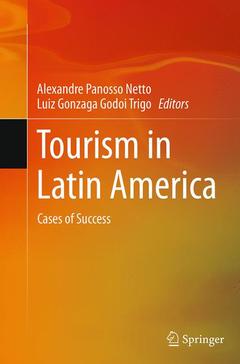Description
Tourism in Latin America, Softcover reprint of the original 1st ed. 2015
Cases of Success
Coordinators: Panosso Netto Alexandre, Trigo Luiz Gonzaga Godoi
Language: English
Subjects for Tourism in Latin America:
Tourism in Latin America
Publication date: 09-2016
Support: Print on demand
Publication date: 09-2016
Support: Print on demand
Tourism in Latin America
Publication date: 09-2014
246 p. · 15.5x23.5 cm · Hardback
Publication date: 09-2014
246 p. · 15.5x23.5 cm · Hardback
Description
/li>Contents
/li>Biography
/li>Comment
/li>
This book presents eleven case studies of success about Latin America tourism. The cases are embedded in a framework describing the economic and cultural foundations of tourism development in the continent. Mexico, Brazil, Chile and Costa Rica are some of the Latin countries which have become examples and models for touristic development, respect for the environment and social inclusion. The book showcases some of the best practices, along with an analysis of how these projects helped improving the environmental and social surroundings and how return on investments has been ensured. Latin America is shown as an excellent example, with the Gross Domestic Product of the continent expanding intensely in the tertiary sector like leisure, hospitality, travel, tourism, entertainment, gastronomy, events and indoor and outdoor recreation. This book is a valuable resource both for professionals in the tourism industry and for researchers in tourism management.
Latin America: imaginary, reality and tourism.- Latin American economy and tourism.- Brazil - Tourism in Rio de Janeiro from the triad beach-Soccer-carnival to complexity of contemporary tourism experience.- Argentinia - Enotourism in Argentina: the power of wine to promote a region.- Chile - Good practices in private parks: Valdivian Coastal Reservation.- Colombia - Cultural tourism in Villavicencio.- Costa Rica: - Protected wild areas and eco-tourism in Costa Rica.- Cuba - Development of products and system of tourism management in Cuban destinations.- Mexico - Practices of corporate social responsibility in the hospitality of Cancun.- Mexico - Endogenous practices Aculo agritourism , Mexico, based on the valuation of the cultural patrimony of their plantations (haciendas).- Panama - Building "The Way": creating a successful tourism brand for Panama and its consequences.- Peru- Success in Progress? Tourism as a tool for inclusive development in Peru's Colca Valley.- Dominican Republic-Dominican tourism Clusters: pillars of development.: Tourism clusters in Dominican Republic.
Alexandre Panosso Netto is professor with exclusive dedication of the School of Arts, Sciences and Humanities at the University of Sao Paulo, Brazil, where he acts in the masters program of Cultural Studies and in the graduate program of Leisure and Tourism. He has experience in the area of tourism, with emphasis on theory of tourism. His research interest includes education in tourism, theories in tourism, tourism experience, touristic planning and epistemology of tourism. He has published 18 books and contributed many papers to scientific journals and edited books. Luiz Gonzaga Godoi Trigo is full professor at the School of Arts, Sciences and Humanities at the University of Sao Paulo, Brazil. He acts in the masters program of Cultural Studies and in the graduate program of Leisure and Tourism. Luiz Trigo was director of tourism of Campinas City Hall (1989-1991), director and advisor of tourism and hospitality of Senac-SP (1995-2004), professor of PUC-Campinas (1988-2007). He is member of EACH/USP Congregation. Luiz Trigo has published 19 books and hundreds of articles and chapters of books in the areas of travel and tourism, education and entertainment. His research interest in tourism is related to culture, education, society, politics, entertainment and the sociology of leisure.
Introduces some of the best cases of tourism development in the continent
Presents models of touristic development both for experts in the leisure and tourism trade and for the academic world
Includes dedicated chapters on the economies and the culture in the continent
© 2024 LAVOISIER S.A.S.




